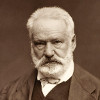“ The misery of a young man is never miserable. The first young lad who comes to hand, however poor he may be, with his strength, his health, his rapid walk, his brilliant eyes, his warmly circulating blood, his black hair, his red lips, his white teeth, his pure breath, will always arouse the envy of an aged emperor. ”
Victor Hugo, Les Misérables (1862). copy citation
| Author | Victor Hugo |
|---|---|
| Source | Les Misérables |
| Topic | strength misery |
| Date | 1862 |
| Language | English |
| Reference | |
| Note | Translation by Isabel F. Hapgood in 1887 |
| Weblink | http://www.gutenberg.org/files/135/135-h/135-h.htm |
Context
“As he thinks of the innumerable enjoyments which nature offers, gives, and lavishes to souls which stand open, and refuses to souls that are closed, he comes to pity, he the millionnaire of the mind, the millionnaire of money. All hatred departs from his heart, in proportion as light penetrates his spirit. And is he unhappy? No. The misery of a young man is never miserable. The first young lad who comes to hand, however poor he may be, with his strength, his health, his rapid walk, his brilliant eyes, his warmly circulating blood, his black hair, his red lips, his white teeth, his pure breath, will always arouse the envy of an aged emperor. And then, every morning, he sets himself afresh to the task of earning his bread; and while his hands earn his bread, his dorsal column gains pride, his brain gathers ideas. His task finished, he returns to ineffable ecstasies, to contemplation, to joys;”
source


